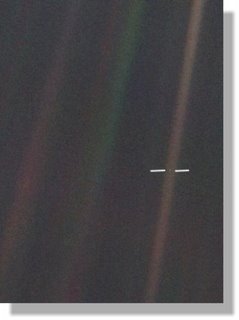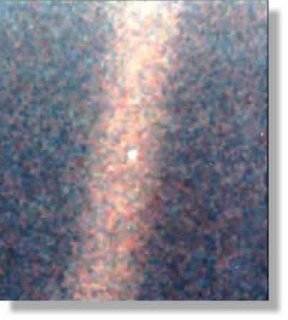On October 13, 1994, the famous astronomer Carl Sagan was delivering a public lecture at his own university of Cornell. During that lecture, he presented this photo:

The photo above was taken by Voyager 1 in 1990 as it sailed away from Earth, more than 4 billion miles in the distance. Having completed its primary mission, Voyager at that time was on its way out of the Solar System, on a trajectory of approximately 32 degrees above the plane of the Solar System. Ground Control issued a command for the distant space craft to turn around, and, looking back, take photos of each of the planets it had visited. From Voyager's vast distance, the Earth was captured as a infinitesimal point of light (between the two white thick marks), actually smaller than a single pixel of the photo. The image was taken with a narrow angle camera lens, with the Sun quite close to the field of view. Quite by accident, the Earth was captured in one of the scattered light rays, caused by taking the image at an angle so close to the Sun. Dr. Sagan was quite moved by this image of our tiny world. Here is an enlargement of the area around our Pale Blue Dot and an excerpt from the late Dr. Sagan's talk:

"We succeeded in taking that picture [from deep space], and, if you look at it, you see a dot. That's here. That's home. That's us. On it, everyone you ever heard of, every human being who ever lived, lived out their lives. The aggregate of all our joys and sufferings, thousands of confident religions, ideologies and economic doctrines, every hunter and forager, every hero and coward, every creator and destroyer of civilizations, every king and peasant, every young couple in love, every hopeful child, every mother and father, every inventor and explorer, every teacher of morals, every corrupt politician, every superstar, every supreme leader, every saint and sinner in the history of our species, lived there on a mote of dust, suspended in a sunbeam.
The earth is a very small stage in a vast cosmic arena. Think of the rivers of blood spilled by all those generals and emperors so that in glory and in triumph they could become the momentary masters of a fraction of a dot. Think of the endless cruelties visited by the inhabitants of one corner of the dot on scarcely distinguishable inhabitants of some other corner of the dot. How frequent their misunderstandings, how eager they are to kill one another, how fervent their hatreds. Our posturings, our imagined self-importance, the delusion that we have some privileged position in the universe, are challenged by this point of pale light. Our planet is a lonely speck in the great enveloping cosmic dark. In our obscurity -- in all this vastness -- there is no hint that help will come from elsewhere to save us from ourselves. It is up to us. It's been said that astronomy is a humbling, and I might add, a character-building experience. To my mind, there is perhaps no better demonstration of the folly of human conceits than this distant image of our tiny world. To me, it underscores our responsibility to deal more kindly and compassionately with one another and to preserve and cherish that pale blue dot, the only home we've ever known."
No comments:
Post a Comment